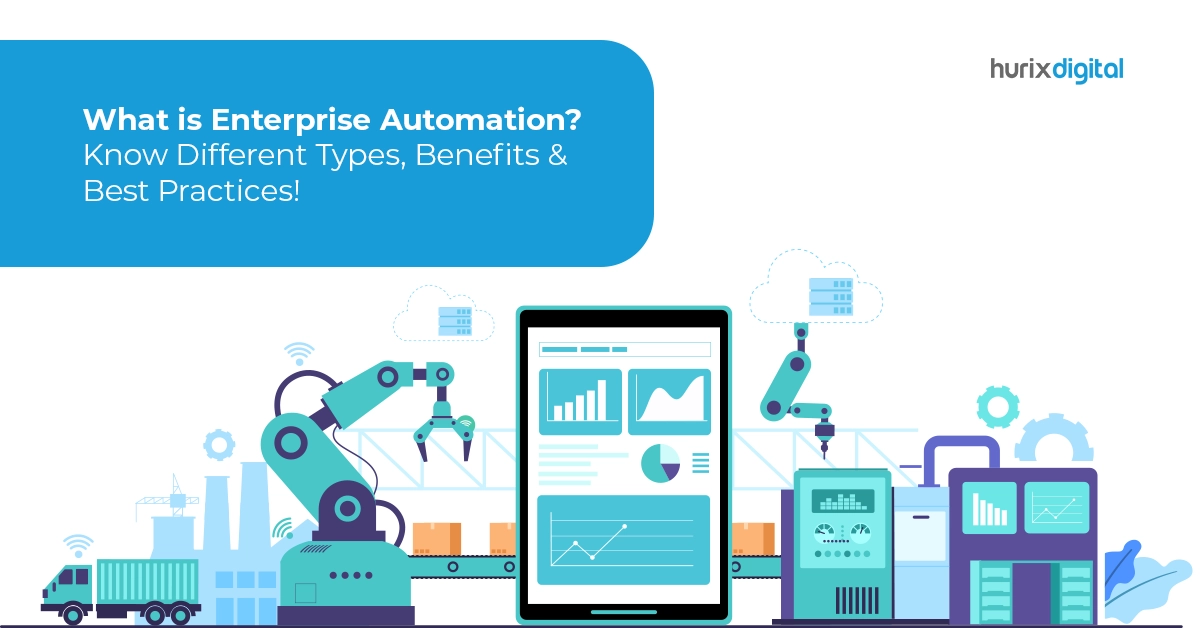What Is Enterprise Automation? Know Different Types, Benefits, and Best Practices!
As businesses scale quickly and acquire more customers, their operations become more complex. Hiring more workforce to streamline and run operations efficiently is not a realistic and cost-effective option.
This solution tends to create more chaos, errors, duplication of data, security breaches, and data leakages, which reduce rather than enhance business efficiency. Automation has been identified as a key solution to meet these challenges.
A survey by Gartner predicts that by 2025, 70% of organizations will implement infrastructure automation. The survey also found that about 85% of the Infrastructure and operations (I&O) that do not have fully automated processes are expected to become more automated between 2023 and 2025.
The survey was conducted with 304 I&O leaders and direct reports at companies drawing $1 billion or more in annual revenues.
The use of enterprise automation is expected to have a massive impact on the operational efficiency and bottom line of businesses. Let’s understand the various types, benefits, and best practices associated with enterprise automation.
Table of Contents:
- What is Enterprise Automation?
- What are the 4 Types of Enterprise Automation?
- What are the Four Benefits of Enterprise Automation?
- What are the Best Practices for Enterprise Automation Culture?
- The Conclusion
What is Enterprise Automation?
Enterprise automation is a tech-enabled strategy where organizations leverage automation software to bring efficiency, accuracy, and speed to work processes. Automation aims to reduce human intervention in repetitive tasks, which consume effort and bandwidth.
Manual efforts in these tasks also result in considerable errors, duplication of efforts and data, and data leakages. By automating a range of repetitive tasks, businesses can function with lean teams, enhance productivity, scale faster, and drive higher return on investment (ROI) with their efforts.
In the United States, low-skill data collection and processing makes up 51% of potential enterprise workflow solutions activities in the economy, which accounts for $2.7 trillion in wages. This work, predominantly done in retail, manufacturing, accommodation, and food services, can be automated end-to-end, resulting in cost savings and greater efficiency.
What are the 4 Types of Enterprise Automation?
Here is a snapshot of various enterprise automation software models, which companies can leverage based on their needs:
1. Basic Automation
This is a form of enterprise automation, which comprises the automation of simple tasks such as basic communication and aggregation of data, as opposed to a process.
Some examples include sending automated emails, backing up files, scheduling, generating reports, and aggregating data on a dashboard.
2. Process Automation
As the name suggests, process automation refers to the practice of automating a business process end-to-end.
Common business processes, such as onboarding new hires and offering customer service, are powered by process automation. Specific processes follow a dedicated workflow, where businesses can reduce human intervention and collect relevant data related to the process.
3. Automated Integration
Automated integration has a unique function. It helps automate a process between two systems.
For instance, culling website information and directly feeding it into a company’s Customer Relationship Management software.
With businesses using multiple software at any given time, automation integration plays an important role in ensuring seamless data flow between systems.
4. Robotic Process Automation
Robotic Process Automation (RPA) is a practice where the use of multiple technologies such as automation, Artificial Intelligence (AI), and Machine Learning (ML) to automate multiple processes, end to end.
RPA is increasingly being used by a wide range of businesses across sectors such as manufacturing, health care, and banking. Repetitive tasks and processes involving supply chain management, financial statement analysis, and post-sales support can be fully automated.
Also Read: Top 9 Benefits of Automation Testing
What are the Four Benefits of Enterprise Automation?
A list of key advantages for businesses include:
1. Efficiency and Speed
Enterprise automation software allows entire workflows to be executed quickly with little or no human intervention.
Businesses can automate enterprise operations in a streamlined, highly efficient manner. The bandwidth of employees is freed up for much more strategic, high-value tasks and increases productivity all around.
2. Accuracy
Accuracy is just as important as efficiency and speed for businesses to run sustainably. Enterprise automation reduces the scope for errors, duplications, and omissions, which can jeopardize the accuracy of projects.
The usage of RPA allows businesses to power even high-value processes accurately, thus revolutionizing the entire operations.
3. Compliance
Using enterprise workflow automation allows businesses to apply new compliance measures seamlessly through enterprise automation software. This helps in reducing the scope for regulatory omissions.
This is an extremely important value-add, especially as regulatory bodies get more strict in their guidelines for all sectors.
4. Data-driven Decisions
Businesses collect a significant amount of data through the use of enterprise automation software. They can customize the dashboard to yield specific data points to help make important decisions.
Access to enterprise workflow solutions with AI-driven predictive analytics allows companies to predict future trends.
What are the Best Practices for Enterprise Automation Culture?
When businesses adopt enterprise, they must consider the following practices:
- Identify key functions within a business that require the use of automation to help bring efficiency and scale.
- Businesses must make an inventory of all activities that are repetitive and consume massive amounts of human bandwidth.
- With access to these two key data points, businesses must have a strategy in place when making the shift to enterprise automation. For instance, businesses must prioritize tasks that reduce ROI and start automating these.
- Businesses must select the right technology solutions that can automate several key tasks. Cloud-based tools, which combine technologies like AI and RPA, can add significant value to a company’s operations.
- As automation takes over various processes in businesses, workforces will need to be reassigned roles per new requirements. Users of each automated software must also receive training to ensure the best.
Also Read: Test Automation vs. Automated Testing – Knowing the Basics
The Conclusion
Enterprise workflow automation is projected to completely transform businesses across all sectors over the next few years.
Businesses that make early investments in automation transformation can bring more efficiency, accuracy, and speed to their operations. They can achieve business goals faster and stay competitive in a dynamic, volatile, unpredictable market.
If your business is looking to automate processes and bring more efficiency to operations, then Hurix Digital is geared to support you in meeting your growing needs. Our enterprise automation technology is available both as a licensed version (one-time buy) and via a subscription model.
Get in touch with us to start a conversation.

SVP & Head – Hurix Technology Solutions
Global Delivery head with 25 years of working experience in NYC investment banks and fintech companies. Hands-on technology delivery management and program management, accountable for stakeholder relationships, Strategic roadmap, P&L, Revenue growth, Account Management, and employee satisfaction.









